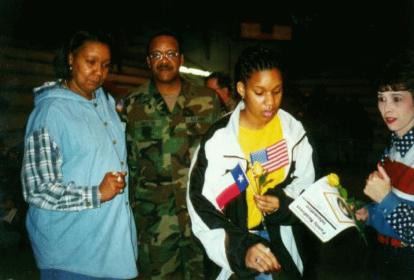CHAPTER 3
Family Readiness for Individual Augmentees
 |  |  |
In a time when the Army's force structure is smaller and its operating tempo is much greater, individuals are tasked to deploy individually in support of various contingency operations. Whether coming from the Active Component (AC) or Reserve Component (RC), individual augmentees face unique challenges in terms of family readiness. This chapter examines some of those challenges, as well as some effective techniques and procedures to manage them.
Individual Augmentees and Family Readiness
Individual augmentees to deployed units need adequate time to prepare their families and themselves for the pending separation and deployment, whether they are Active or Reserve Component soldiers. In many cases, individual RC and AC augmentees to the stabilization force (SFOR) were given only short notice before deploying to the theater of operations. Many of the augmentees were told of their pending activation, temporary duty (TDY), or temporary change of station (TCS) less than two weeks prior to the date on which they were to begin movement. When this is this case, augmentee soldiers and their family members are frequently not prepared for the deployment in terms of pay, healthcare, dental care, property, and other personnel services. This situation lowers the morale of both the soldier and the family back home. It also adds to the stress associated with the deployment separation. Augmentees who had one to two months' notice prior to deployment generally did not report these types of family support problems. The problems were particularly acute among augmentees not having prior deployment experience and not living in close proximity to active duty military installations. Some single soldiers also pointed out that they felt their needs had been ignored due to an assumption that as single soldiers they had none of these considerations.
Individual RC augmentees ordered to active duty need to be included in the Family Readiness Group (FRG) operations of the units to which they are assigned in the theater of operations. In many cases, individual RC augmentees to the SFOR did not live near the active duty military post of the unit to which they were assigned upon activation. Observation has shown that when this is this case, RC augmentee family members are frequently left out of the deployed unit's FRG. This exclusion occurs even more frequently when the unit to which the RC augmentee is assigned has already deployed. When the gaining unit fails to incorporate the RC augmentee into its FRG, the gaining unit then has difficulty in contacting the soldier's family with updated information on the deployment or with news of any changes in the soldier's status. This difficulty is even more acute with that percentage of augmentees whose families relocate to be near parents or others during the period of deployment.
Individual augmentees who do not live near an active duty military post also need special assistance in preparing for deployment to the theater of operations. In many cases, these augmentees encountered serious difficulties in preparing their families for the impending separation. They experienced difficulty in establishing healthcare and dental care plans, and it was not uncommon for their families to be left out of the gaining active unit's usual family support and information-dissemination activities. For the RC augmentees with prior (and recent) deployment experience, these difficulties had less of an impact. Given the great number of RC augmentees being activated for service in a variety of operations, this problem is an increasingly common one.
Key Lessons Learned
- The gaining unit and the RC higher headquarters should contact the individual RC augmentees as soon as they are activated.
- Include the RC augmentee soldier in both the RC FRG and the AC FRG. This way assistance and support can be given to the family as well as vital information from the deployed unit's FRG.
Command and Unit Responsibilities
Individual augmentees to active duty unit deployments coming from the RC without recent deployment experience need special assistance in preparing for deployment. In many cases, individual augmentees indicated that they encountered serious difficulties in getting information about the deployment from the Army Reserve Personnel Command (AR-PERSCOM) and about the units to which they were being assigned. The types of information included deployment dates, packing lists, the means through which pay and healthcare problems would be handled, points of contact within deployed units, and the nature of their responsibilities within the unit to which they were assigned. Some augmentees also indicated that they encountered difficulty in procuring their orders in a timely fashion. These difficulties inevitably had an adverse impact upon the soldier's ability to get their families properly prepared for the impending separation, since the orders are required for a variety of personnel services.

 |  |  |
|
NEWSLETTER
|
| Join the GlobalSecurity.org mailing list |
|
|
|

